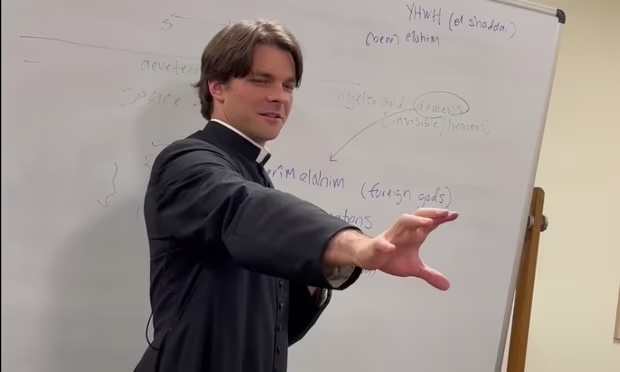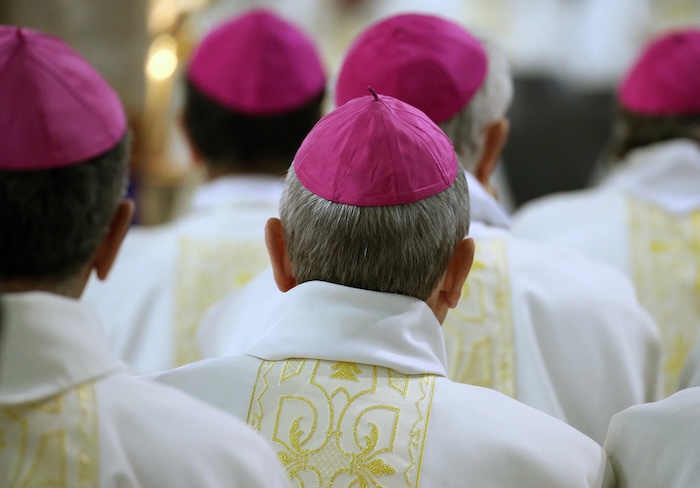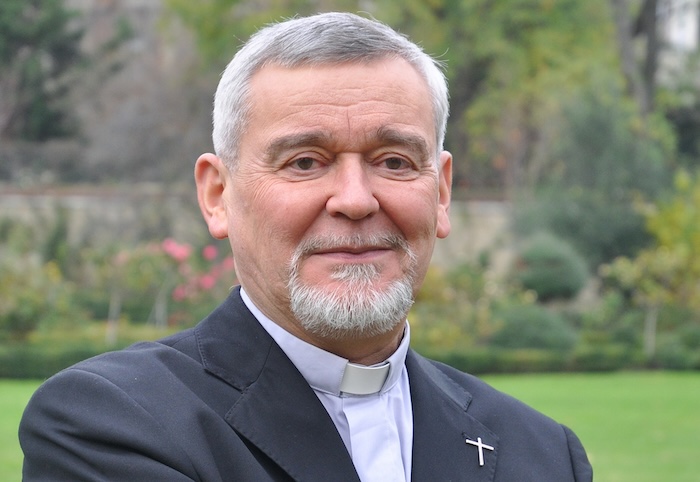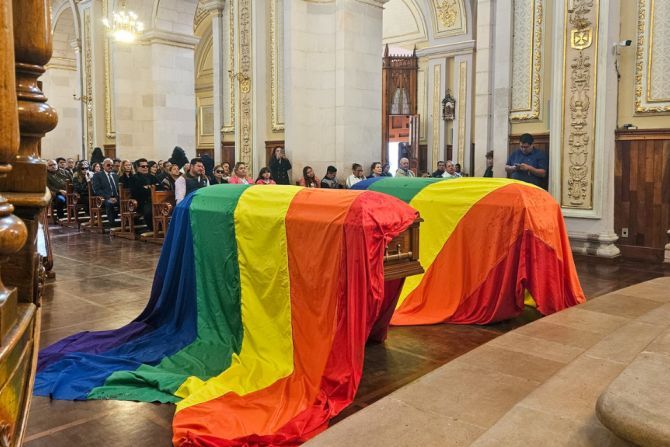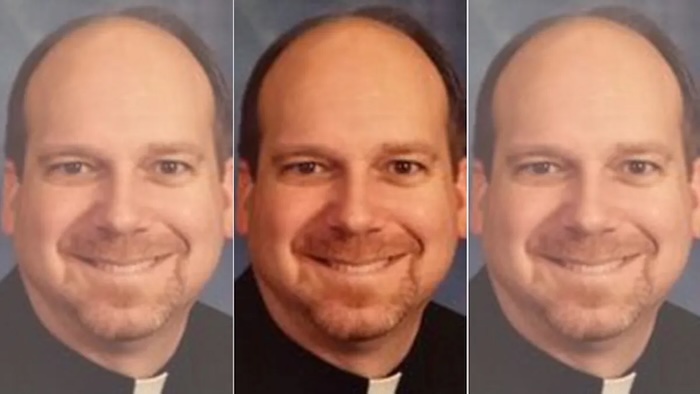
By Claudia Vercellotti and David Clohessy
One of the most notorious predator priests in northwest Ohio has just been given a stiff sentence for his sex crimes by a federal judge after this case came to the attention of the FB, in an unrelated investigation.`
Last Friday, Judge Jack Zouhary sent Fr. Michael J. Zacharias to a federal prison for a long time.
The priest, formerly the pastor of St. Michael’s parish in Findlay, was arrested by the FBI in 2020 on multiple charges of sexual crimes, including human trafficking.
He allegedly “manipulated and coerced drug-addicted boys and men into sex” and made a “confession video” in which he performed oral sex on a then-adult victim.
Zacharias admits to first meeting one of his victims when he was an aspiring Seminarian and the boy was a sixth-grader at St. Catherine’s in Toledo.
According to bishopaccountability.org, a second young man told the FBI he met Zacharias as a first-grader, and that the then-seminarian began sexually abusing him as a teen after being ordained a Deacon and then Catholic priest.
Does it get much uglier than this?
Be very disturbed
Here are several takeaways from this disturbing case:
• For decades, the Catholic hierarchy has claimed “these predator priests all hurt kids a long time ago. We’ve since gotten better at selecting and training more healthy seminarians and priests.”
• Their intent is clear: promote complacency, mollify the flock and pretend these crimes are all in the past. But Zacharias’ crime spree started when he was a seminary student studying to become a priest. It continued through his ordination as a Catholic deacon and then a Catholic priest and, worse still, after the Toledo Catholic Diocese revamped its own policies on childhood sexual abuse.
• The Catholic Church hierarchy’s claim is at best premature and at worst intentionally misleading.
There’s some truth here of course. For instance, Fr. Stanislaus Wojciechowski was ordained in 1937, Fr. Alexander Pinter was ordained in 1943, Fr. Joseph J. Pucci was ordained in 1941, and Fr. George Schmit was ordained in 1935. All of these clerics worked in the Toledo diocese and are “credibly accused” child molesters, according to official church websites.
But plenty of other sexually troubled clerics joined the ranks of the ordained more recently. Among them are:
• Former Central Catholic High School religion teacher Fr. Stephen Rogers — ordained in 1995, later convicted of child pornography in 2003
• Deacon J. Michael Tynan was days away from being ordained when he was arrested and ultimately convicted of child pornography in 2004.
• Fr. Samuel Punnoor — ordained in 1996, deemed “credibly accused” in 2020
• Fr. James H. Roth — ordained in 1995, later deemed “credibly accused” by church officials in 2015
How about Zacharias? He was ordained in 2002.
Clearly, bad men are still joining the priesthood. Doesn’t this mean continued vigilance, not foolish complacency, is required by parents, parishioners, police, prosecutors and the public?
Which court?
Ohio lawmakers should take note of where Zacharias was held accountable for his crimes — in a federal courtroom.
This was the third Diocese of Toledo Catholic cleric to face sentencing in federal court since 2002 when the Diocesan officials joined U.S. bishops nationwide pledging “openness, honesty and transparency.”
Why wasn’t Zacharias tried in state court?
Largely because Ohio legislators continue to cave to lobbyists for the bishops and the insurance industry by refusing to eliminate or extend Ohio’s archaic, predator-friendly statute of limitations.
Most states are lifting these arbitrary deadlines so more victims can use the courts to warn the public about child molesters.
But, tragically, Ohio continues to protect those who commit and conceal horrific crimes against kids, instead of protecting the kids themselves.
Worse still? When child advocates publicly asked Ohio Attorney General Yost to follow the steps of other surrounding states and convene a formal investigation into the cover-up of sexual crimes against minors by the Roman Catholic church, he publicly said ‘his hands are tied,’ and deferred activists to lawmakers.
This must change in the next legislative session.
One might think that Zacharias’ particularly heinous crimes and harsh sentence might light a fire under Toledo Bishop Daniel Thomas and prod him to take decisive action towards prevention and disclosure of clergy sex crimes. Afterall Zacharias served in Toledo, Findlay, Van Wert, Mansfield and Sandusky.
Is it possible there are other victims?
His crimes that are known spanned over two decades. What is Thomas doing to actively reach out to every parishioner, alumni and the communities at large where this now-convicted sex offender worked and lived?
Sadly, that doesn’t seem to be happening.
Within hours of the judge’s decision, Thomas issued a short, tepid statement to the media essentially “passing the buck” to the Vatican, which makes the ultimate decision on whether a convicted sex offender will be formally defrocked or remain in the priesthood.
“Today’s sentencing of Michael Zacharias in federal court marks another step towards justice for all of those harmed by his actions. As I expressed in my May 12, 2023, statement following his conviction, “The acts of which Rev. Michael Zacharias has been found guilty are reprehensible, morally deplorable, and manifestly contrary to the dignity due to each human person and the dignity of the priesthood.”
Why does the bishop do active roll-out campaigns when he is fundraising or lobbying for votes in state elections, and only issue a small statement electronically in what the federal judge called, “one of the most disturbing cases” he’s presided over?
The bishop made no pledges to try harder or do better regarding kids’ safety. Somewhat shockingly, he made no mention of Zacharias victims. He didn’t praise them for their courage or even offer an apology to them.
The bare minimum
And, predictably, Thomas failed to acknowledge the unrefuted testimony of an eighth-grade victim who testified under oath that he reported to the pastor at St. Catherine’s shortly after then-seminarian Zacharias first sexually abused him only to be told, ‘It’s all in your head.”
Even the federal judge acknowledged during Zacharias’ sentencing the credibility of the victims and the efforts the eighth-grade victim made to report timely that were not followed up on by church officials.
How many crimes and lives could have been spared falling prey to Zacharias if the pastor who this information was reported to had simply called the police? Notified the victims’ parents?
Worst of all, perhaps, Thomas refused to appeal to other victims, witnesses or whistleblowers — with information about Zacharias’ crimes or other wrongdoing by other church staff — to step forward and call law enforcement.
That’s precisely what a true leader would do: take affirmative steps to root out corruption in his institution. That’s what must happen if abuse is to be exposed, cover-ups are to be deterred, and children are to be safer.
Instead, however, Thomas does what so many in the Catholic hierarchy have done for so long and still do: the absolute bare minimum.
But thankfully, Toledo-area Catholics are increasingly taking a different tack.
More and more, we have noticed that churchgoers are slowly becoming better able to detect grooming and abuse, and they are more inclined to report it to police and prosecutors.
Still, more must be done, especially by those at the highest ranks of the church, to safeguard the vulnerable and heal the wounded.
As the government’s case against Fr. Michael Zacharias, whose crimes span at least two decades illustrates, the stakes are just too high to ignore. These clergy child predators do not spontaneously stop.
They must be stopped.
Complete Article ↪HERE↩!

